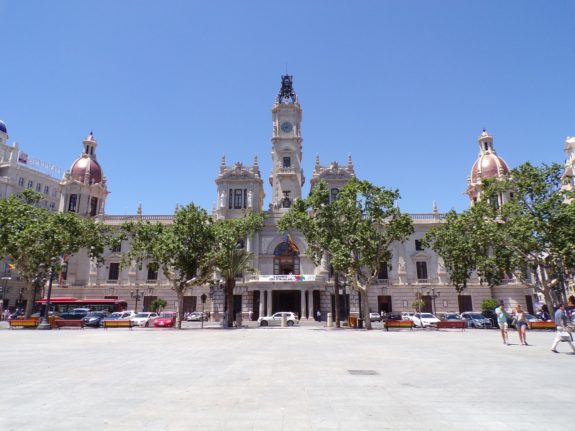Easter
Easter or Semana Santa is one of the most important festivals in Spain with events taking place across the country. Some of the biggest and best celebrations will be held in the cities of Seville, Granada, Málaga, Zamora, Valladolid, Cuenca and Cáceres. Easter officially starts on March 24th this year with Palm Sunday and will last until Easter Sunday on April 1st. Elaborate processions, masses and giant religious floats characterise most of the events taking place.
The only national holiday during Holy Week will be on Good Friday, March 29th. March 28th, known as Maundy Thursday, will be a holiday in all the regions except Catalonia and Valencia. These regions will have their bank holiday on April 1st or Easter Monday instead.
Easter Monday will also be a festivo in the Balearic Islands, Cantabria, Navarra, La Rioja and the Basque Country, which will be the only regions with three holidays during Holy Week.
READ ALSO: What are the best cities in Spain to see the Semana Santa processions?
Valencia’s Las Fallas and other events taking place
Valencia’s fire-cracking Las Fallas festival takes place in March. Although it usually officially begins on March 1st, the celebrations have been delayed due to the devastating apartment block fire on Thursday March 22nd. Despite this, the main and most important days of the festival, from March 15th to 19th, will still take place. Las Fallas is Valencia’s most important festival and during this crazy fiery event, huge elaborate paper mâché sculptures called fallas are set up across the city. On the last night, they are ceremoniously burned during the Nit de la Cremà during a crazy fiery display.
There are also smaller Fallas events taking place in towns such as Alzira and Sagunto. Other events taking place in Spain in March are the Cherry Blossom Festival in Jerte, Cáceres, which usually happens during the second half of the month and the historic celebrations of the Fiesta de la Arribada de la Carabela La Pinta de Baiona from March 1st – 3rd and the Reconquista da Vila de Vigo on March 28th.
New rent price index to be applied in March
Spain’s Minister of Housing Isabel Rodríguez has confirmed that she will publish the new rental price index before the end of February, meaning that will be operational in March.
The Rental Reference Price Index will come into force in ‘stressed’ areas to further control prices. ‘Stressed zones’ are considered to be areas that exceed the Consumer Price Index (CPI) of their respective province by five points and where families dedicate more than 30 percent of their salary to paying the rent.
READ ALSO: How Catalonia will control prices in ‘stressed rental areas’
Electricity prices go up
Electricity bills for many people in Spain will go up again this March, with previously capped VAT rates due to rise further.
Due to unexpected falls in electricity prices (below €45/MWh) in February ,VAT on electricity bills will now rise again to the standard 21 percent, as in keeping with the legislation.
Say your consumption adds up to €100. With the previous 10 percent VAT cap you would’ve paid €110, and with 21 percent the amount will now be €121.
READ MORE: Spain’s electricity price hikes in 2024 – What you need to know
WhatsApp introduces changes in March
The communication app, WhatsApp, which is widely used in Spain (35.8 million active users) will bring in several changes in March meaning that it will soon no longer be compatible with certain mobile phone models that are still in operation.
According to Meta, the company that owns the application, starting in March several devices will lose full access to the popular instant messaging platform because they do not comply with established security standards. As per the official WhatsApp statement, the application will no longer be compatible with devices that use anything earlier than Android 5.0 or iOS 12 in the case of Apple phones.
Madrid offers dozens of affordable rental apartments in March
Madrid will raffle off dozens of affordable rental apartments in March. The rents for these apartments will not exceed 30 percent of a family’s income, with the average rental price being between €300 and €600 per month. The first 164 homes will be located in two developments in El Cañaveral and will be intended for low-income families and young people.
Later there will be more apartments available in different areas. The Housing Policy Area will allocate 80 percent of the apartments available to the above groups.
Drop in variable mortgage interest rates in March
Those with a variable mortgage rate in Spain will see their situations improve from March onwards. The Bank of Spain predicts that starting in March the reviews of mortgage loans will yield cheaper monthly payments. This puts an end to an upward cycle that began in December 2021, which saw interest rates for financing homes rise to 4.5 percent.
Spain’s national rail service Renfe calls for a strike
Renfe train drivers have called for a four-day strike in March to protest over their employment plan. The stoppage has been called by the Spanish Union of Railway Drivers (Semaf), who are planning three days of 24-hour strikes on March 1st, 4th and 12th.
There are also further walkouts planned throughout the day on March 6th from 7am to 10am, from 1pm to 4pm, and from 7pm to 10pm. According to Semaf, the strike has been called due to non-compliance with contract clauses concerning working hours and the freezing of their employment plan.
International Women’s Day
International Women’s Day takes place on March 8th and in Spain focuses particularly on gender violence and women’s rights. Protests and marches typically occur throughout the country.
In Madrid, it has already been confirmed that two demonstrations will be held in the city. One on defending the Trans Law and the other on the abolitionist of prostitution. The Feminist Movement of Madrid march will tour Cibeles and Plaza de España starting from 7pm.
In Barcelona for the first time, a manifesto will be read to express the firm commitment of Barcelona City Council to the feminist struggle and to denounce all the inequalities and discrimination that women suffer in all areas. The manifesto will be read on March 8th, at 9am in the Plaza de Sant Jaume.
Deadline for declaring foreign assets to the tax authorities
The deadline for declaring all foreign assets over €50,000 including properties and bank accounts will be on March 31st. You need to do this via Modelo 720 between January and March following the end of the tax year. It relates to the assets held abroad in the last calendar year. So, for example, if you were a Spanish Tax Resident in 2023, you need to file form 720 from January 1st to March 31st, 2024 about the assets you held at the end of 2023.
READ ALSO: Do I really need to declare foreign assets to Spanish taxman by March 31st 2023?
Spanish Father’s Day
Spanish Father’s Day takes place on March 19th and coincides with the festival of San José. This day was chosen because San José or Saint Joseph was the Virgin Mary’s husband and father figure to Jesus, representing the values of being a good husband and a good father.
The day is celebrated with gifts of appreciation. Children typically make handmade presents at school to bring home and shops have continued to add to the tradition, making it bigger and more popular by selling specialised Father’s Day gifts and cards.
READ ALSO: How a female teacher campaigned for Spain to have a Father’s Day
Amnesty law talks continue in March
The Spanish government has approved an extension to complete the proposed Amnesty Law and has set March 7th as the deadline.
Although the deadline expires on March 7th, the Justice Commission can meet before that date if an agreement is reached. If the groups decide to speed up the deadlines for negotiation, they could try to have it debated the week of March 11th or the 18th.
The law will grant total impunity for all acts committed “in the context of the so-called Catalan independence process” between January 1st, 2012 and November 13, 2023.
READ ALSO – RECAP: Spain’s controversial Catalan amnesty deal in four key points
The clocks change
Due to daylight savings time, clocks will change in Spain on Sunday, March 31st. The clocks will be moved forward one hour meaning that when it’s 2am, the time will jump to 3am. This means sunrise and sunset will be about one hour later on Mar 31st than the day before and there will be more light in the evenings.
Spring officially begins
Spring officially starts in March. This year it will fall on March 19th, which is the spring equinox in the northern hemisphere. But, for many, it feels like spring started in Spain a while ago. Days have been unseasonably warm, there has been less rain than usual and the trees have already begun to blossom, much earlier than expected.
Spain experienced its warmest January since current records began in 1961. According to the national weather office Aemet, the average temperature in mainland Spain for January 2024 was 8.4C, or 2.4 degrees higher than average for the period and 0.4 degrees above the previous record set in 2016.
Spring in Spain is becoming shorter and shorter each year summer begins earlier. In the past 70 years, summer heat has been arriving between 20 and 40 days earlier than it should (depending on the region). Other studies by Aemet have shown that summer is 40 days longer now than it was in the 1980s.



 Please whitelist us to continue reading.
Please whitelist us to continue reading.
Member comments